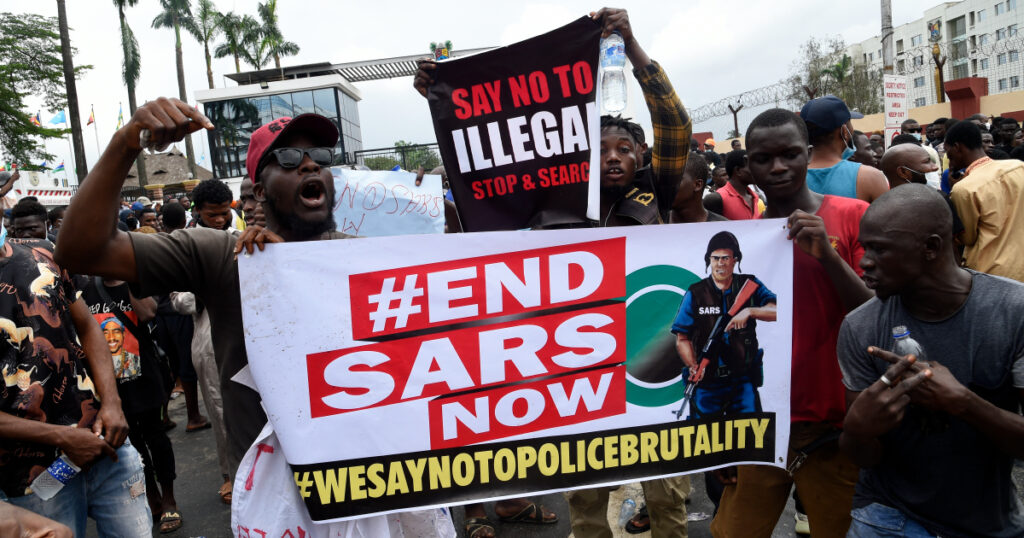#ENDSARS protest: The kind of Police Nigeria needs — Lawyers, CSOs
By Henry Ojelu
Like a wide fire, the #EndSARS protest embarked on a few days ago by some youth against incessant harassment, arrest, detention and extra-judicial killing by the Special Anti-Robbery Squad, SARS, of the Nigeria Police, has spread across the country.
Irked by the failure of successive governments to address the horrible human rights abuses by officers of the squad, thousands of youths in Abuja, Lagos, Osun, Delta, Rivers matched the streets to register their anger and frustration.
Initially, little attention was given to the protesters by both the federal and state government but after days of relentless agitations with many blocking major roads and sleeping overnight at protest venues, some senior police officers and government officials addressed the aggrieved youth assuring them that the issue would be tackled. Despite those assurances, the mind of the protesters were all made up- SARS must be disbanded.
With the protest already spreading abroad to the United Kingdom and the United States of America and disrupting social and economic activities, the Inspector-General of Police, Muhammed Adamu on Sunday, bowed to pressure and announced the disbandment of SARS. Further to the demand of the protesters, President Muhammadu Buhari, on Monday addressed the nation assuring that the entire Nigeria Police will be reformed.
Previous botched SARS reform directives
Following the horrible report of rape, killing, kidnappings, torture and other horrible acts of SARS officials, Vice-President Yemi Osinbajo on August 14, 2018, ordered with immediate effect the “Overhaul” of SARS. Osinbajo ordered the then Inspector-General of Police, Ibrahim Idris to reform SARS. After the order, the IGP announced that the unit would be renamed to Federal Special Anti-Robbery Squad and that a new head of the unit would be appointed with the provision of human rights desk officers to check reports.
Again on January 21, 2019, IGP Adamu ordered the immediate decentralization of the Special Anti-Robbery Squad. The SARS unit was centralized from the force headquarters in Abuja since its inception. The IGP also stated that the DIG of the Force Criminal Investigations Department and Commissioners of Police in each state would be held accountable for actions of the SARS. Despite these reforms, the notoriety of SARS official continued unabated.
The kind of Police Nigeria needs
Following President Buhari’s assurance to protesters on Monday that the Nigeria Police will be reformed, Law and Human Rights spoke to lawyers and civil society organisations on the kind of changes that should take place within the Nigeria Police to tackle reoccurring issues human right abuse of citizens.
NASS should amend constitutional powers of police —Ozekhome, SAN
Mr Mike Ozekhome, SAN, believes that the key way to ensure efficient and effective police in the country is for the National Assembly to amend the constitution and cut the powers of the police.
He said, ‘We need reforms that make the police wear a human face, carry out its constitutional duties of effective policing, to protect the Nigerian people. The National Assembly currently amending the Constitution should break down the behemoth powers of the police contained in sections 214 and 215 of the 1999 Constitution and allow for federal, state, LGA and community policing as obtains in advanced countries like the USA. The police should truly be the friend of the Nigerian people, not extrajudicial killing and highway bribe-taking anti-people elements.”
Holistic reform of security network needed — Adegboruwa, SAN
Advocating for a holistic reformation of all the security outfits in the country, rights activist, Ebun-Olu Adegboruwa, SAN, noted that reforming the police alone will not tackle the problem of intimidation and harassment by armed security officers.
According to him, “It will be good for the government to embark upon a holistic reformation of the security network of the nation, not just the police force. This should involve manpower development, improvement of the welfare of security personnel, provision of critical infrastructure to enhance intelligence gathering and to facilitate constant interaction with the public.
“The rot in the police is deep-rooted and goes beyond SARS. Just disbanding the existing structure will only then be scratching the surface. This is not what Nigerians need now but a totally new police force they will also embrace community policing in all the rural areas.”
Personal liability by erring police officers will check rights abuse— Ojo
Senior Lecturer, Faculty of Law, Lagos State University, Gbenga Ojo is of the opinion that if police officers are made to personally bear liability for their actions in the event of a lawsuit over human rights abuse, some of the impunity perpetrated by them will reduce.
According to Ojo, Police brutality must be addressed generally with an emphasis on SARS because of their notoriety and total disregard to rule of law and human rights.
He said, “Personal liability by the erring officers, where damages are awarded by the court.The problem is that, erring Police officers don’t get to pay the damages or part of it. So he has nothing to loose, if he breaches your human rights or brutalize you. I think the name of the erring officers found culpable by the courts should be compiled regularly and sent the Police Commission or even the IGP. This should apply to Police officers, operatives of the EFCC and ICPC.
“We should not do the reforms piecemeal. Let the reforms cut across all of them. Set up a committee on this, call for a memorandum from members of public and let the committee come up with recommendations for reforms. The recommendation should be given force of law through the National Assembly for the Police officers to know do and don’ts.”
Reward system for police must improve —Malachy
Former National President, Committee for the Defence of Human Rights, CDHR, Malachy Ugwummadu emphasised the need for an effective reward system to tackle some of the internal challenge faced by police officers.
He suggested the following measures as a necessity in the planned reform of the police. “The role of the Police Service Commission relating to the discipline of Police officers lower than the rank of the Inspector General of Police must be reactivated and strengthened.
“The Force should take seriously the issue of indiscipline in a way that establishes the minimum standards below which a police officer cannot operate. A robust reward system for exceptional officers should be encouraged and promoted as guide and inspiration.
“Those already identified for extrajudicial killings must be thoroughly investigated, prosecuted and punished.”
FG approach to recruitment must change —Evans
Executive Director, Cadrell Advocacy Centre, Evans Ufeli opined that the system of recruitment of police officers by the federal government must change
In his recommendations, Ufeli said, “The entire police force, with it special formations require holistic and synthetic reformation. Policing in Nigeria is about survival for the officers as their welfare and job descriptions are not effectively defined for optimum performance. An average policeman in Nigeria carries a gun and stands on the road angrily looking for citizens to extort to survive. We have to stop that very dangerous method first before we begin the conversation on police reforms and not just end SARS.
“Police recruitment and the Federal Government’s approach to handling internal security is the major problem. A situation where police work has been so downgraded such that the only people who apply to join the force are those who could not find employment in the Labour Market and have been applicants since only God knows when, take police work as a last resort, as a means of survival. This is fundamentally irresponsible and such cannot be sustainable. This has to stop.
“The job of a police officer is a noble profession and the government must make a conscious effort the rebrand it because the police as presently constituted has become an albatross, a part of the problem it was created to solve. This has to stop and the conversation on police reforms can only be meaningful if we all decide to change our behaviors, become patriotic and embrace a better and positive image of our country. The government too must make a commitment to reprimand and punish erring police officers who break the law to tarnish police image.”
Sheriff and Civil Process Act must be amended- Access to Justice
Civil society organisation, Access to Justice on its part, recommended several steps that must be taken including the amendment of Sheriff and Civil Process Act to check police impunity.
Some of the measures suggested by the group include; Do more than lip-service, and immediately commence the reform of all law enforcement and security institutions in order to confront and kick out deeply entrenched cultures of lawlessness and impunity within them.
“For this purpose, government must itself lead by example. By showing intolerance for acts of lawlessness and impunity, and complying with court orders, government will set the marker for law enforcement and security agencies’ conducts in this respect.
“Government must conduct a thorough review or audit of [the dissolved SARS operations, and, for this purpose, establish a fact-finding Inquiry into how the unit transformed into a notorious scheme of oppression and injustice; every SARS official who was involved in the brutal and widespread assault of citizens and the violations of human rights must be brought to justice, including being prosecuted, in order to safeguard against similar atrocities in the future.
“Government must re-organize current accountability systems in order for police services to function accountably. The Police Service Commission which is constitutionally responsible for the discipline of members of the Police Force is practically toothless and unable to implement its crucial mandate.
Government must immediately abrogate laws such as the Sheriff and Civil Process Act [SCPA] 2004 – which make it nearly impossible for courts to hold the police and other law enforcement and security agencies – to account.
Unless those laws are jettisoned, courts may also continue to face daunting challenges in upholding the rule of law and punishing the infraction of civil rights. Furthermore, law enforcement and security institutions (and their operatives) will continue to act with impunity knowing that Nigeria’s laws, in practice, shield and protect them from being made accountable for their actions.”



Comments
Post a Comment